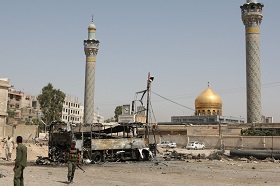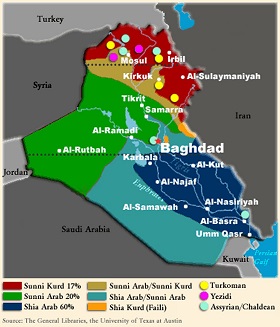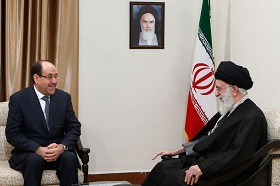Iraq Continues to Disintegrate
Government forces are fighting rebellious
Sunni tribes and an al-Qaeda splinter group,
the ISIL in western Anbar province,
February 26, 2014
In
Login if you are already registered
(no votes) |
(0 votes) |
Correspondent, Expert magazine, Research fellow of the RAS U.S. and Canadian Studies Institute
The civil war in Iraq is raging on – local Sunnis have risen up against the Shiite authorities. According to UN figures, a total of 7,800 civilians and more than 1,000 security forces were killed in Iraq in 2013 alone. However, in January 2014 instability escalated into a full-scale insurgency against the authorities. The causes of the uprising lie in the Sunni elite’s resentment of its position in the country and in the role played by external forces.
The civil war in Iraq is raging on – local Sunnis have risen up against the Shiite authorities. The causes of the uprising lie in the Sunni elite’s resentment of its position in the country and in the role played by external forces.
It is not the case that the country entered a period of stability after American military withdrawal. According to UN figures, a total of 7,800 civilians and more than 1,000 security forces were killed in Iraq in 2013 alone [1]. However, in January 2014 instability escalated into a full-scale insurgency against the authorities. In the Al Anbar Governorate, the country’s largest region – where most residents are Sunni Muslims – a number of Sunni militant organizations are active. These include the Islamic Army in Iraq, the Islamic Front of the Iraqi Resistance, the Jaish Ansar al-Sunna (Arabic for “Army of the Followers of the Teachings”), and the Mujahideen Shura Council. However, it is the Islamic State of Iraq and the Levant (ISIL) that appears to be one of the most dangerous among them. And the Iraqi army has proved unable to effectively deal with this threat, despite the $20 billion [2] that the Americans spent on training and over $12 billion [3] that the Americans spent on arms contracts over the years 2010-2013 to equip the Iraqi authorities.
As a result, the Iraqi government today is not in control of a significant part of Al Anbar province, including major cities. The worsening situation in the region has already created humanitarian problems – by the end of January 2014, 140,000 refugees, nearly 10 percent of the population, fled the province. “This is the largest displacement Iraq has witnessed since the sectarian violence of 2006-2008,” said UN High Commissioner for Refugees spokesman Peter Kessler [4].
The Iraqi government today is not in control of a significant part of Al Anbar province, including major cities. The worsening situation in the region has already created humanitarian problems
Problems with the Sunnis in Al Anbar province distract the Iraqi authorities from solving the pressing issue of maintaining control over Iraqi Kurdistan. Iraqi Kurds, which used to be in desperate need of Basra terminals (through which hydrocarbon resources from Kurdish areas were exported), found an alternative export supply route. They will soon be exported to Europe via Turkey under an agreement reached with Turkish Prime Minister Recep Tayyip Erdogan. In exchange, the Iraqi Kurds have pledged not to interfere with Turkish government efforts to restore order in the country’s south-eastern regions.
Some analysts believe that these problems will inevitably lead to the disintegration of the country. “Iraq is breaking apart before our eyes along the natural sectarian borders of Kurdistan, Sunni-stan, and Shiite-stan, and that drift apart looks increasingly inevitable," said Robert Baer [5], a former CIA case officer and author of several books on the Middle East. However, it is not impossible that the state will retain its territorial integrity. This requires Nouri al-Maliki’s government to modify its domestic policies and offset the destructive influence by external actors, chiefly Saudi Arabia.
Necessity to Contain Iran
Saudi Arabia’s contribution to the destabilization of Iraq is primarily rooted in significant changes in the Middle East security system. Following its policy of stabilizing relations with Iran, the U.S. has destroyed the containment system of the Islamic Republic that Saudi Arabia had created for years. All Saudi Arabia’s attempts to reach compromise with Washington failed, and the kingdom faced a dilemma.
Riyadh could display solidarity with its allies, take U.S. security guarantees, and accept the planned lifting of a number of sanctions against Iran (primarily the oil embargo imposed by the U.S. and EU, as well as the ban on exporting high-tech products to Iran). However, this would have meant not only financial losses for Saudi Arabia (due to Iranian oil entering the global oil market and the consequent fall in oil prices), but also a dramatic increase in Iran’s influence on the territories stretching from Afghanistan to Lebanon, including the Gulf monarchies of UAE, Bahrain, and Kuwait that are in Saudi Arabia’s sphere of influence. Some experts say that a stronger Iran could even lead to the collapse of Saudi Arabia itself [6]. Iran could exploit instability in Saudi Arabia over the issue of succession. Under a law passed by founder of the Saudi state Abdul Aziz Al Saud, after his death power was to be transferred not from father to son (as is customary in most monarchies) abut from Abdul Aziz’s eldest son to the next oldest. Now almost all Abdul Aziz’s sons have passed away and there is no agreement among the next, third generation of the House of Saud as to who should take the throne after the death of Abdul Aziz’s last son. If a compromise cannot be found, the country could descend into civil war, during which Iran could take control of the Kingdom’s Shiite territory, which boasts some of Saudi Arabia’s major oil fields.
However, it is not impossible that the state will retain its territorial integrity. This requires Nouri al-Maliki’s government to modify its domestic policies and offset the destructive influence by external actors, chiefly Saudi Arabia.
Therefore, Riyadh chose the second option, i.e. deterring Iran without external assistance. In doing so, Saudi Arabia continues, in particular, to destabilize the situation in Syria by supporting terrorist groups loyal to Riyadh, forcing Iran and its ally Bashar Assad’s regime to allocate additional financial, diplomatic and human resources for that conflict. However, this particular tool cannot be used indefinitely – the Syrian army continues to pursue an offensive against the insurgents, the West refuses to support terrorist groups, and Turkey, which only recently sponsored militants in northern Syria quite actively, is looking to see reconciliation with Iran.
Attempts to create a collective security system on the basis of the Cooperation Council for the Arab States of the Gulf (which includes Saudi Arabia, UAE, Kuwait, Qatar, Oman and Bahrain) represented another instrument of deterrence, although one still lacking efficiency. Saudi Arabia could neither promote anti-Iranian integration under the Council, nor involve a country with combat-ready armed forces (chiefly Jordan and Morocco).
Removing Nuri al-Maliki

Elena Suponina:
Shiites and Sunnis: The Danger of Major War
from Syria to Pakistan
Destabilization of Iraq – the “pearl” in the sphere of Iranian influence – takes on particular significance as the third tool to curb Iran.
Given the serious setbacks, the destabilization of Iraq – the “pearl” in the sphere of Iranian influence – takes on particular significance as the third tool to curb Iran. Supporting attacks by Sunni civil activists and militants and the movement of jihadists from Syria to Al Anbar, Riyadh wants to overthrow the government of Shiite Prime Minister Nuri al-Maliki, who has close ties with Iran, or at least draw him into a long-term crisis. If they manage to aggravate the situation so seriously that the Iranians have to intensify efforts to protect their interests and the Shiite government (such as sending their special forces to carry out a clean-up operation in Al Anbar province), it is possible that America would view this as direct occupation of Iraq, where they still have considerable interests in the oil sector. This could disrupt the resolution of U.S.-Iranian relations.
Saudi’s plans in a sense succeeded – Iran did not stay out of the Iraqi conflict. In early 2014 it became known that agreements were signed in November 2013 for the delivery of Iranian weapons to Iraq (small arms, mortars, ammunition, communication and night vision devices). The total contract value was estimated at $195 million [7]. Formally, the Iraqis and the Iranians had every right to enter into such a deal, since the UN sanctions on Tehran only relate to the export of heavy weapons, while the rest are national restrictions imposed by the EU and the U.S. “We have begun the fight against terrorism and want to win this battle. Nothing will prevent us from buying weapons from any country,” said Ali al-Moussawi, a spokesman for Nuri al-Maliki [8].
However, Washington took a different view. “Any transfer of arms from Iran to a third country is in direct violation of the United Nations Security Council sanctions. We are seeking […] to ensure that Iraqi officials understand the limits that international law places on arms trade with Iran,” said U.S. State Department spokeswoman Jen Psaki [9]. As a result, the parties were forced to officially refute the deal [10], which failed to dispel Americans’ suspicions, and forced Washington to keep a close eye on Iranian-Iraqi relations.
Reluctance to Share

This rise in Iraqi oil production undermines Riyadh’s significant efforts to keep the oil price above $100 a barrel.
Another aspect of Saudi Arabia’s interests in destabilizing Iraq lies in control over Iraq’s oil sector. According to OPEC, Iran’s daily production of oil increased in February 2014 by 400,000 barrels and reached 3.4 million barrels per day – the highest level for decades [11]. About 2.8 million barrels per day went to exports. If Baghdad sustains oil sales of 2.9 million barrels per day, its revenue could swell to over $100 billion (average exports of 2.4 million barrels per day last year earned Baghdad about $89 billion) [12]. However, the Iraqi authorities do not intend to stop there, and plan to boost oil production to 4.5 million barrels per day by the end of 2014, and to 9 million barrels per day by 2020 [13].
Iraqi officials make no secret of the fact that part of their supplies to Europe will go not through Basra but through new and safer routes, including Syria. “We hope that as soon as this Syrian situation stabilizes – the country will have to be rebuilt again – Iraq will use the old route through Syria, implemented through new pipelines,” said Iraq's Deputy Prime Minister for Energy Hussain al-Shahristani [14].
This rise in Iraqi oil production undermines Riyadh’s significant efforts to keep the oil price above $100 a barrel. The Kingdom, anticipating external and internal instability, cannot afford to see the price fall. However, Saudi Arabia cannot exert influence on Baghdad and Tehran (Iran also intends to increase supply volumes, and wants to coordinate its oil policy with Iraq) through OPEC tools, since both countries were excluded from OPEC’s quota system. Due to the fact that Riyadh got a substantial part of their quotas, Saudi Arabia will have to reduce production volumes if Iran and Iraq return to the quota system.
Ignoring Sunnis Was a Mistake
Meanwhile, the blame for the worsening situation in Al Anbar province rests to a large extent with the Iraqi leadership itself. After coming to power, the government of Nouri al-Maliki did virtually nothing to integrate the Sunni political elite into power and distribute Iraqi oil export revenues. In fact, the cabinet concentrated on preventing the Baathists from returning to power rather than bringing the country together [15].
Under this pretext, Nouri al-Maliki hounded a number of Sunni leaders, including Vice-President Tariq al-Hashimi, who was accused of running death squads, and fled to Qatar. One of the last repression victims before the uprising in Al Anbar was Iraqi Sunni MP Ahmed al-Avlani, who was accused of links with terrorists. At the end of 2013, Iraqi police launched a special operation to arrest him. In response, the Sunnis tried to organize terrorist attacks and mass acts of civil disobedience. A protest camp was set up near the city of Ramadi, but Iraqi security forces cleared it under the pretext that the camp housed terrorist leaders. In the clashes during the dismantling of the camp, about ten people were killed and several dozen were injured [16]. Government forces called them “militants”, but the use of violence against demonstrators provoked a negative reaction from the Sunni political establishment. 44 Sunni members of Iraq’s parliament resigned in protest, and serious unrest in Al Anbar province escalated into a full-scale uprising and the seizure of the province's largest cities – Fallujah and Ramadi.
As a result, today Sunni insurgents and the jihadists from Syria and other Arab countries who joined them retain control over a number of regions and cities in the province. Nouri al-Maliki’s attempts to reach agreement with the local tribes (in late February 2014 the prime minister publicly offered regional Sunni leaders $80 million “in reconstruction funds” [17] ) have not yielded any significant results. The problem is that the local elites distrust the government and its promises. The Americans also failed to single-handedly neutralize the Sunni insurgents, and they therefore negotiated with local tribes, actually hiring their fighters. In exchange, the Americans and the Iraqi government promised to integrate Sunni tribal fighters into the Iraqi armed forces. However, after the U.S. withdrawal, Nouri al-Maliki failed to deliver on those promises. Moreover, he cut salaries to citizen soldiers, who, according to spokesman for the Sunni Mutahidun party Dhafer al-Ani, “were left stuck in the middle between al-Qaeda’s hammer and Maliki’s neglect.” [18] As a result, “there is a revolt in the desert led by a younger generation of Sunni tribal leaders, who are pissed off and reject the older generation's failed outreach to Maliki and the central government,” said Robert Baer [19].
This showdown in Iraq is being closely watched by other countries. The outcome of this confrontation is extremely important for some of them, and has the potential to directly impact their national security.
Tactically, Iraqi stabilization is advantageous for Russia. Strategically, however, this stabilization carries certain threats for Russia.
So, an influential regional player and a key sponsor of the “Arab Spring” – Qatar – took a very ambiguous position. Doha currently supports a number of terrorist groups fighting in Iraq, but it is possible that this position will change in the near future. It is no secret that recently the relationship between Qatar and Saudi Arabia has deteriorated badly: the Kingdom is not happy with the position taken by the young Qatari Emir who, contrary to agreements reached, continues to support the “Muslim Brotherhood” and pursues a policy that is broadly hostile to Riyadh. Moreover, given Qatar’s rapprochement with Iran, analysts do not rule out that if the civil wars in Syria and Iraq end, Qatar may join the Iranian pipeline project to Turkey through Iraq and Syria (before relations with Saudi Arabia deteriorated, Qatar intended to join the Saudi pipeline).
Moscow also occupies an ambiguous position. Tactically, Iraqi stabilization is advantageous for Russia, since it allows Russian companies to participate more actively in the development of Iraqi oil fields and get contracts to rebuild the country. Strategically, however, this stabilization carries certain threats for Russia, and not just due to the opportunities it would open up for building an Iran-Turkey pipeline through Iraq. The end of civil unrest would enable Iraq to continue increased oil production and exports, and if Baghdad fails to reach agreement with OPEC, the price of this precious “black gold” (on which Russia’s economy is so dependent) may fall.

In mid-March 2014, the U.S. delivered about
100 Hellfire missiles along with small arms
to Iraq
Iraq continues to be an extremely valuable asset for the United States, and this significance will increase dramatically if Washington proves unable to make progress in negotiations with Tehran. It is precisely for this reason that the White House immediately complied with Nuri al-Maliki’s request for military assistance. The Iraqi prime minister managed to get more American weapons. Thus, in mid-March 2014, the U.S. delivered about 100 Hellfire missiles along with small arms to Iraq. “It is essential that Iraqi Security Forces are equipped with modern and effective weaponry, given the serious threat [...] the ISIL now poses to Iraq and the region,” the U.S. Embassy in Iraq said in a statement [20]. In addition, the Iraqi prime minister was able to negotiate the delivery of Apache attack helicopters. It is worth recalling that previously this transaction was stopped by a number of Congressmen [21]. Now, with these objections removed, Iraq will get six Apache helicopters in summer and another 24 over the next three years.
The Iraqi prime minister clearly indicated that he opposed sending American troops to fight terrorists in addition to weapons delivery. “Iraq today is no longer a protectorate; it is a partner. Iraqis are grateful to the American soldiers who serve in our country, some of whom made the ultimate sacrifice. But today Iraq is a sovereign country that does not need American boots on the ground,” said Nuri al-Maliki [22].
However, despite an extremely serious situation which Iraq is now facing, its collapse is unlikely. First, this collapse does not serve the best interests of the three major foreign actors, namely Iran, Turkey and the United States. Tehran considers Iraq as its sphere of influence. Ankara plays an intricate Kurdish game and is actually walking on thin ice, trying to prevent creation of independent Kurdistan which will be extremely disadvantageous to it. The United States needs a strong central Iraqi government to pursue its economic interests in that country and make the latter an anti-Iranian sanitary cordon, should the American-Iranian talks fail.
Iraq continues to be an extremely valuable asset for the United States, and this significance will increase dramatically if Washington proves unable to make progress in negotiations with Tehran.
Second, Saudi Arabia – the key external destabilizer – is not interested in Iraq’s collapse either. Under certain circumstances (in particular, quota assignment and fair distribution of power instruments among all major ethno-religious groups in the country), the Sunni and Kurdish minorities in a unified Iraqi state may become a serious deterrent for the ruling Shiite majority. In the case of the country’s division, an economically deprived Sunni state will be established (there are extremely scarce developed oil reserves on the territory of the Sunni provinces), while the Basra oil fields will be under full control of the Shiites.
Thus, the most likely scenario is the continuation of the civil conflict in Iraq, which will occasionally pass into acute phases. And since Iraq is an object of the regional policy, the country’s stabilization will largely depend on normalizing relations within the Iran-United States-Saudi Arabia triangle.
1. Ottaviani Jacopo. The Iraq War never ended. Foreign Policy. February 10, 2014 http://www.foreignpolicy.com/articles/2014/02/10/iraq_body_count_map_war_dead
2. Morris Loveday. Iraqi army struggles in battle against Islamist fighters in Anbar province. The Washington Post. February 26, 2014 http://www.washingtonpost.com/world/middle_east/iraqi-army-struggles-in-battle-against-islamist-fighters-in-anbar-province/2014/02/25/b76792d2-9b00-11e3-8112-52fdf646027b_story.html
3. M. Agadzhanjan. Irak: Jekstremistskij "internacional" zatachivaet ostrye ugly "sunnitskogo treugol'nika". Rugnum. January 3, 2013 http://www.regnum.ru/news/polit/1751193.html#ixzz2w8njEydR
4. Anbar violence displaces 140,000, says UN. The National. January 24, 2014 http://www.thenational.ae/world/middle-east/anbar-violence-displaces-140-000-says-un
5. Kitfield James. Turns Out, Joe Biden Was Right About Dividing Iraq. National Journal. January 30, 2014 http://www.nationaljournal.com/magazine/turns-out-joe-biden-was-right-about-dividing-iraq-20140130
6. See, for example, Davidson Christopher. Arab sunset. Foreign Affairs, October 10, 2013 http://www.foreignaffairs.com/articles/140096/christopher-davidson/the-arab-sunset
7. Iran postavit v Irak oruzhie na $195 millionov. RIA Novosti. February 24, 2013 http://ria.ru/world/20140224/996777995.html#ixzz2wAvyeDl6
8. Iran postavit v Irak oruzhie na $195 millionov. RIA Novosti. February 24, 2013 http://ria.ru/world/20140224/996777995.html#ixzz2wAvyeDl6
9. Gosdep SShA obespokoen soobshhenijami o postavkah oruzhija iz Irana v Irak. Golos Rossii. February 25, 2014. http://rus.ruvr.ru/news/2014_02_25/Gosdep-SSHA-obespokoen-soobshhenijami-o-postavkah-oruzhija-iz-Irana-v-Irak-4992/
10. Glava MID Iraka oproverg svedenija zapadnyh SMI o postavkah vooruzhenij iz Irana. ITAR-TASS. February 26, 2014 http://itar-tass.com/mezhdunarodnaya-panorama/1006386
11. Dobycha nefti v Irake v fevrale dostigla rekorda. Aziatskij reporter. March 13, 2014 http://asiareport.ru/index.php/news/41100-dobycha-nefti-v-irake-v-fevrale-dostigla-rekorda.html
12. Iraq returns as world's fastest-growing oil exporter. Reuters. March 05, 2014 http://www.reuters.com/article/2014/03/05/iraq-oil-idUSL6N0M22P120140305
13. Nouri al-Maliki. A comprehensive strategy against terrorism. Foreign Policy. February 18, 2014 http://www.foreignpolicy.com/articles/2014/02/18/a_comprehensive_strategy_against_terrorism
14. Irak rasschityvaet k koncu goda narastit' dobychu na 9-12%. October 04, 2013 http://www.nefttrans.ru/news/irak-rasschityvaet-k-kontsu-goda-narastit-dobychu-na-9-12.html
15. See, for example, V Irake arestovany 615 jeks-chlenov «Baas», sunnity govorjat o politicheskoj mesti so storony shiitov. Gazeta.ru, October 30, 2011 http://www.gazeta.ru/news/lenta/2011/10/30/n_2074950.shtml
16. Sunnitskie deputaty vyshli iz parlamenta Iraka posle razgona lagerja manifestantov v Ramadi. ITAR-TASS. December 31, 2013 http://itar-tass.com/mezhdunarodnaya-panorama/866968
17. Getting worse. The Economist. February 27, 2014 http://www.economist.com/blogs/pomegranate/2014/02/iraqi-politics?zid=308&ah=e21d923f9b263c5548d5615da3d30f4d
18. To retake cities, Iraq turns to Sunni tribes. The Washington Post. January 30, 2014 http://www.washingtonpost.com/world/middle_east/to-retake-cities-iraq-turns-to-sunni-tribes/2014/01/30/561a0a32-83b3-11e3-a273-6ffd9cf9f4ba_story.html
19. Kitfield James. Turns Out, Joe Biden Was Right About Dividing Iraq. National Journal. January 30, 2014 http://www.nationaljournal.com/magazine/turns-out-joe-biden-was-right-about-dividing-iraq-20140130
20. U.S. delivers Hellfire missiles, ammunition to Iraq. The Washington Post. March 16, 2014 http://www.washingtonpost.com/world/middle_east/us-delivers-hellfire-missiles-ammunition-to-iraq/2014/03/16/ce75f57c-ad1b-11e3-b8b3-44b1d1cd4c1f_story.html
21. Igor Pankratenko. Irak: vojna na zakaz. Stoletie. January 9, 2014 http://www.stoletie.ru/geopolitika/irak_vojna_na_zakaz_116.htm
22. Nouri al-Maliki. A comprehensive strategy against terrorism. Foreign Policy. February 18, 2014 http://www.foreignpolicy.com/articles/2014/02/18/a_comprehensive_strategy_against_terrorism
(no votes) |
(0 votes) |






